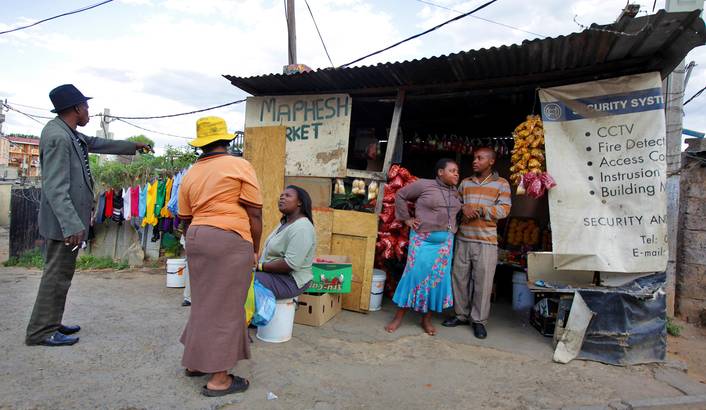News
The Agents of Economic Reform
The announcement by Statistics South Africa that the South African economy contracted in the second quarter of 2015 by 1.2% should be a wake-up call for anyone still complacent about the country's prospects.

Former Director, The Brenthurst Foundation

Former President and CEO of the NEWSEUM, USA

Searching for explanations, or excuses for failure, will not get South Africa’s stalled economy moving. Whoever, and whatever, is at fault, there are five strategic requirements for reforms to address the overriding need to create not only more, but better jobs. By Greg Mills and Jeffrey Herbst.
The announcement by Statistics South Africa that the South African economy contracted in the second quarter of 2015 by 1.2% should be a wake-up call for anyone still complacent about the country’s prospects. At the same time, the instability in stock markets worldwide, plunges in commodity prices, and the fall of the rand suggest that the immediate future may be even more difficult. It is therefore critical that South Africa develop a coherent economic policy that will promote growth and allow it to weather the inevitable storms ahead.
Yet the diagnosis of the contemporary problem seems to depend on whether you are in or out of government.
From an African National Congress (ANC) perspective, as Economic Development Minister Ebrahim Patel contended in the National Assembly in August, the government should not be blamed for the current woes. No surprises there. This was a result, he said, of the global downturn in commodity prices. Pointing to the deteriorating situation in other mineral-producing countries, including Australia and Canada, he defended the government’s record of ‘robust’ job creation.
According to the ANC view, South Africa’s economic challenges are also not the fault of global markets alone. As President Jacob Zuma has put it, weak growth is also down to the nature of the Apartheid inheritance, what he terms ‘colonialism of a special type’. Speaking in Pretoria in early August, the president noted: “Other countries in Africa never had a racially based economy … We are trying to address the legacy of apartheid, and it’s going to be with us a long time.” He added: “At the same time (South Africa) must be competing with countries that never had such a challenge.”
For the opposition, expectedly, low economic growth is, in the words of Democratic Alliance leader Mmusi Maimane, “a direct result of the failure of the ANC government”. Rejecting the argument that global economic conditions are to blame, Maimane has pointed to comparatively high rates of growth predicted across developing markets and sub-Saharan Africa, more than twice the South African figure. “Instead of taking responsibility, the president blames global economic conditions,” says Maimane.
We believe they are both partially right and both partially irrelevant. Certainly, South Africa’s tragic inheritance from apartheid matters and will continue to affect the country for decades. Yet, other countries—such as Vietnam—have been able to grow despite exceptionally difficult histories. South Africa’s commodity-based economy is a challenge now but this is true partially because it missed the opportunity to use the bonanza of high commodity prices during the last decade to diversify. And while the ANC’s economic policy – or its failure to implement its own policies – is also to blame for much of what has gone wrong, it is still necessary to have a better idea of what to do.
Searching for explanations, or excuses for failure, will not get the economy moving. Whoever and whatever is at fault, our recent book, How South Africa Works – and Must do Better (Pan Macmillan), based on several hundred interviews in key economic sectors across the country, identifies five strategic requirements for reforms to address the overriding need to create not only more, but better jobs:
- First, there is a need for responsive policy, and responsible government. We argue that the government should measure every policy against one key indicator: Will this help to create jobs? In so doing, it should guard against the unintended consequences of policy, and of bad policy – such as that on visas. It has to avoid attempts at silver bullet solutions, which don’t exist, and learn from others, especially Asia, in pivoting towards competitiveness, attracting businesses by offering them policy certainty, not constant U-turns and empty promises.
- Second, the minimum wage and labour laws must be changed so that employers are actually encouraged to hire workers. Across the country, we found that employers were simply afraid to hire workers because the wage bill was often too high by comparison to their competitors in other countries, and because they might not be able to adjust their workforces in the future. There is a particular need here to guard against collusion between big business and big labour in the setting of wages. Big business can cope with high wages by employing fewer workers and big labour’s members benefit from high salaries. The losers in this are small and medium-sized businesses and the unemployed. Competitiveness will also require undoing the suffused elitism which has characterised black economic empowerment initiatives.
- Third, there is a need for better skills. While education is the route to sustainable empowerment, delivery on education has been a chronic failure of the last 21 years. South Africa spends nearly a fifth of its budget on education, yet the return on such an expensive but necessary investment is poor. Teachers are more answerable to unions than to schoolchildren and parents, denying future generations equal opportunities.
- Fourth, there is an imperative for greater efficiencies. This includes the parastatals, such as Eskom and South African Airways, which should not just be places where the privileged elite have jobs, but should serve the public. There is a need to prioritise ending government bloat driven by increases in the civil service and its wage bill and resulting in unsustainable debt for future generations. Equally important is the requirement to address the spatial geography of Apartheid by bringing jobs to where people live, not expecting them to spend their income on just getting to and from work, just working to work. And South Africa has to recognise that cities are growth poles of our economy, as they are globally, ensuring in the process that they have greater powers to improve their own business conditions to spur national competitiveness.
- Finally, and most importantly, creating the conditions for all of the above demands fresh politics, the heart of the economic issue. There is little economic reward in simply deepening the already well-worn groove of blaming the Apartheid legacy and externalising the causes of current woes to global markets and domestic conspiracies. Yet the government remains unable or unwilling to implement its own prescriptions, notably in the form of the stillborn National Development Plan (NDP).
A change of economic direction will require a political dispensation capable of talking constructively with business and labour, and of using its electoral mandate to implement its policies.
Herein is the key question: is this change of political direction more likely from within the ANC – or is it more likely that an opposition can take power offering such a new path?
Both the government and opposition are understandably over-devoted to their own political interests: one to retain and the other to seize power. What is clear is that the government has little chance of implementing its own policies without a willingness to shake up its cosiness with labour and its communist allies, and without shaking off its tendency to revert to short-termist political manoeuvring around identity rather than implementing its own big ideas as with the NDP. No matter the political temptation, it will not be able to carry out both the NDP and National Democratic Revolution; investors will not allow it to have its cake and eat it.
The official opposition has eloquently attacked the ANC’s record and its leadership, notably “a broken man, presiding over a broken society”. It has also punted the Western Cape and City of Cape Town as prospective examples for the entire country due to their record of governance, investment and growth.

But more is likely required. While such tactics may offer occasional headlines and bylines, the Democratic Alliance has so far been unable to convincingly articulate an ‘offer’ to break the politics of identity and inclination to regulate that constrains competitiveness, entrenches entitlement and corruption, and weakens South Africa’s governance. Promoting such a new vision will require carefully building anticipation, setting a political tempo through careful messaging, capturing the public imagination, and providing the policy detail of alternatives. It is likely not enough to seize the attention of South Africans through the failure of others; they will have to be convinced by the prospect of something fresh.
Thus slogans and substance have to be present, in equal measure. ‘Pay back the money’, to take a topical example, should be matched by a convincing diagnosis and captivating prognosis.
Economic choices are all about politics both nationally and within organisations. Someone, somebody, is going to have to have the chutzpah, personal and institutional organisation, strategic vision and leadership, and tactical nous to boldly, as the parable would have it, tie the bell around the pussycat’s neck; put differently, to shake up their organisations in laying out clear steps to address an economic and political crisis many years in the making. Absent that leadership, the already stygian South African economic condition can only darken.
Dr Mills heads the Johannesburg-based Brenthurst Foundation; Dr Herbst the Newseum in Washington DC. They are the authors of How South Africa Works – and Must do Better (Pan Macmillan).
Photo: Residents of the huge shanty town of Alexandra township buy goods from the informal corner 'spaza' shop near Sandton, Johannesburg, South Africa, 15 October 2010. EPA/KIM LUDBROOK.
This article was originally published in The Daily Maverick.
